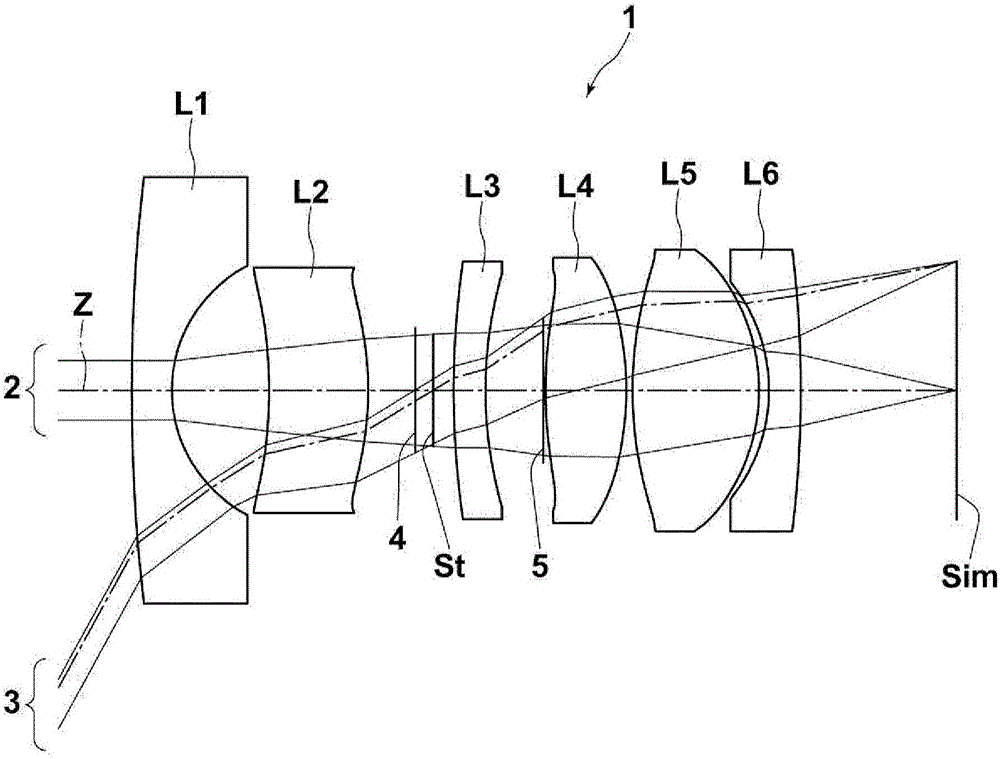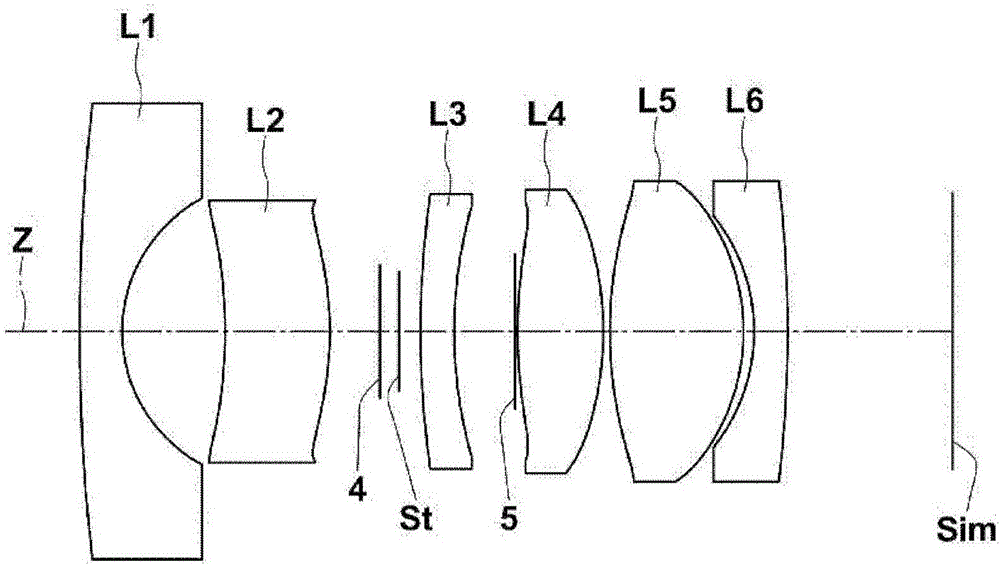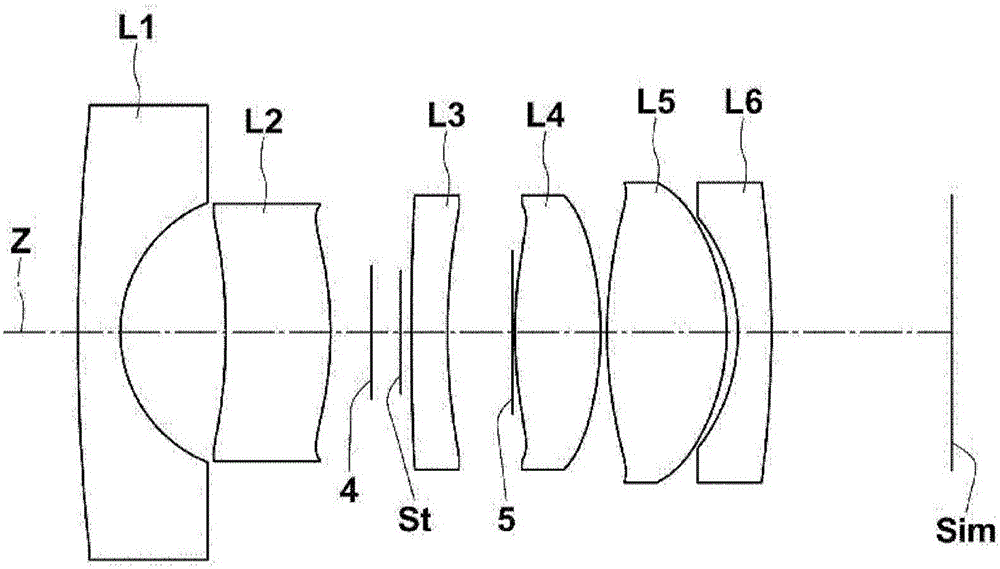Pick-up lens and pick-up device
A camera lens and lens technology, which is used in optical observation devices, image communication, transportation and packaging, etc., can solve the problems of small F value, inability to obtain high resolution, and many residual aberrations, and achieve the effect of small F value
- Summary
- Abstract
- Description
- Claims
- Application Information
AI Technical Summary
Problems solved by technology
Method used
Image
Examples
Embodiment 1
[0184] figure 2 A cross-sectional view of the imaging lens of Example 1 is shown. The imaging lens of Example 1 is composed of six lenses, namely the first lens L1 to the sixth lens L6. exist figure 2 In the figure, the left side is the object side, the right side is the image side, and the aperture stop St, the above-mentioned first light shielding member 4 , and the second light shielding member 5 are also shown. It should be noted, figure 2 The aperture stop St, the first light shielding member 4 , and the second light shielding member 5 shown do not necessarily represent sizes and shapes, but represent positions on the optical axis.
[0185] Table 1 shows basic lens data of the imaging lens of Example 1, and Table 2 shows aspheric coefficients. The column of Si in Table 1 shows the numbering of the faces of the constituent elements in such a manner that the object-side face of the most object-side constituent element is set as the first and increases sequentially to...
Embodiment 2
[0208] image 3 A cross-sectional view of the imaging lens of Example 2 is shown. Table 3 shows the basic lens data of the imaging lens of Embodiment 2, and Table 4 shows the aspheric coefficients, Figure 12 , Figure 21 Each aberration diagram in a state of focusing on an object at infinity is shown.
[0209] 【table 3】
[0210] Example 2
[0211] f=3.35, Bf=4.30, FNo.=2.27, 2ω=122.6°
[0212] Si Ri Di Ndj vdj *1 46.3783 1.0112 1.58313 59.38 *2 3.1881 2.5131 *3 -13.4465 2.5001 1.80610 40.93 *4 -8.0867 1.6700 5(St) ∞ 0.2499 6 63.9530 0.8632 1.92286 18.90 7 15.0562 1.6101 *8 10.5055 2.0399 1.80610 40.93 *9 -7.6909 0.1549 *10 10.4629 2.8474 1.61881 63.85 *11 -4.9605 0.2699 12 -4.2728 0.8000 1.92286 18.90 13 -25.9702 4.3020
[0213] 【Table 4】
[0214] Example 2
[0215] face number 1 2 3 4 KA 1.0015654E+00 9.80347...
Embodiment 3
[0217] Figure 4 A cross-sectional view of the imaging lens of Example 3 is shown. Table 5 shows the basic lens data of the imaging lens of Embodiment 3, and Table 6 shows the aspheric coefficients, Figure 13 , Figure 22 Each aberration diagram in a state of focusing on an object at infinity is shown.
[0218] 【table 5】
[0219] Example 3
[0220] f=3.31, Bf=4.12, FNo.=2.26, 2ω=130.0°
[0221] Si Ri Di Ndj vdj 1 46.3786 1.0200 1.58313 59.38 2 3.2332 2.5830 *3 -16.2066 1.8749 1.80610 40.93 *4 -9.4864 1.7610 5(St) ∞ 0.2500 6 212.1128 0.8567 1.95906 17.47 7 20.7117 2.0115 *8 9.4219 2.0465 1.80610 40.93 *9 -9.1476 0.1549 10 9.2275 3.1492 1.61881 63.85 11 -5.0420 0.2840 12 -4.1226 0.7999 1.95906 17.47 13 -17.3321 4.1164
[0222] 【Table 6】
[0223] Example 3
[0224] face number 3 4 8 9 KA 4.9943054E+00 -3.2075243E...
PUM
 Login to View More
Login to View More Abstract
Description
Claims
Application Information
 Login to View More
Login to View More - R&D
- Intellectual Property
- Life Sciences
- Materials
- Tech Scout
- Unparalleled Data Quality
- Higher Quality Content
- 60% Fewer Hallucinations
Browse by: Latest US Patents, China's latest patents, Technical Efficacy Thesaurus, Application Domain, Technology Topic, Popular Technical Reports.
© 2025 PatSnap. All rights reserved.Legal|Privacy policy|Modern Slavery Act Transparency Statement|Sitemap|About US| Contact US: help@patsnap.com



